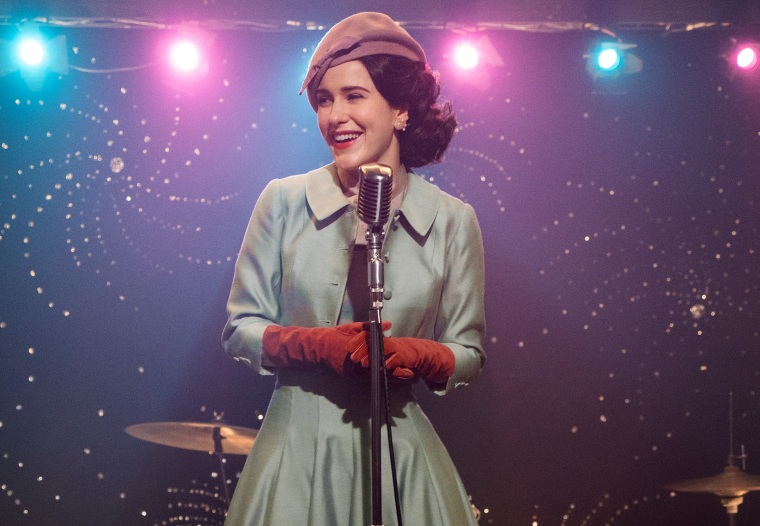Mrs. Maisel has returned to Amazon, and she is still marvelous. The second season of Amazon’s first major award-winning series arrived this week, fresh off four wins at the Emmys and just before it was nominated for several Golden Globes. The good news is the show has the sense to keep a lot of what made its premiere season so great. Its hyper-specific recreation of late-1950s New York City is still on point. Rachel Brosnahan is still remarkably adept at both playing the title character, Midge Maisel, and also putting on a believable stand-up comedy routine. Every episode is like an hour of joy handed out on a gilded platter. But no show is perfect, and this season’s flaws will likely feel familiar to fans of Amy Sherman-Palladino’s last hit TV show, “Gilmore Girls.”
But while the texture of the show is beautifully done, the showrunners have trouble when they venture outside of a pretty clearly established bubble.
Clearly, Sherman-Palladino’s team has created a love letter to a very specific time, place and culture. In the middle of Hanukkah, the arrival of a show that is not just unapologetically Jewish, but revels in it, is the best present anyone at Amazon could have delivered. And "Mrs. Maisel" doesn’t feel the need to hurry through exposition, content to let scenes unfold slowly and sumptuously. There’s a moment in the opening episode where Rose Weissman (Marin Hinkle), Midge’s mother, commands her daughter to stop and breathe. “Be in the moment. Look around where you are, you’re in Paris. Take it in. Internalize it,” she says. It might as well be the show’s mantra.
But while the texture of the show is beautifully done, the showrunners have trouble when they venture outside of a pretty clearly established bubble. Not that they don't try here and there. The opening episode finds Midge and her father Abe (Tony Shalhoub, who is supporting MVP this season) in Paris with Rose. But the change of locale doesn’t work, and by the end of the hour it’s clear the characters need to return home and stay there, or at least stay within the tri-state area (and yes, the Catskills count.)
The show's inability to stray far from its comfort zone is a big problem that’s unlikely to go away. At the end of season one, Midge gets her big break, introduced to the comedy world by Lenny Bruce. For “Mrs. Maisel” to have a career that works, she should be basically dumping her children on invisible nannies (well, ok she’s already doing that), kicking that useless drip of a husband Joel (Michael Zegen) to the curb and capitalizing on her newfound career momentum.
But the show doesn’t want to do that, because it would mean leaving behind everything Midge loves, and everything the writers love. Instead, the first half of the season seems to find every reason to stall her career, up to and including decisions that would capsize most fledgling comedians. Midge goes to Paris. She gets her job back at the Revlon counter. The family goes to the Catskills. Manager Susie (Alex Borstein) complains that two months off will kill Maisel’s momentum, but she might as well be talking about the series itself. And all the while, Midge continues to insist her marriage is worth saving. (Even her husband realizes this is a pretty stupid endeavor.)
Manager Susie (Alex Borstein) complains that two months off will kill Maisel’s momentum, but she might as well be talking about the series itself.
“Gilmore Girls” suffered from as similar problem, and it’s not hard to find parallel plot points. Husband Joel has an entire narrative arc, for example, that does little more than divert energy. This echoes the decision to continually push Rory’s dad back into the picture in “Gilmore Girls,” even though it was abundantly clear that he and Lorelai were a bad match.
More worryingly, Midge’s behavior is starting to get even more self-serving as she undermines the people working their tucheses off to help launch her career. Despite Susie calling her out after a particularly egregious act, the show allows most of this behavior to slide because Midge can apparently do no wrong. This inability to recognize and acknowledge internal character flaws is what led to the disaster that was Rory in the “Gilmore Girls” Netflix revival.
The show is great when it stays focused on Midge, and her true north of comedy. But “Marvelous Mrs. Maisel” needs to be careful lest — like its main character — all this early success goes to its head. The show is caught between the world it wants to stay in and the forces calling Midge to leave.
Eventually, both Midge and the series will have to take a bit of a risk and choose a path forward. Leaving the comfortable confines of the Upper West Side could result in the show’s collapse — or Midge’s. Or it could save the show. But until then, there’s no reason we can’t tale a few minutes to stop and simply be in the moment. It’s 1959 and you’re in the heart of bustling New York City. Take it all in, it’s glorious.
